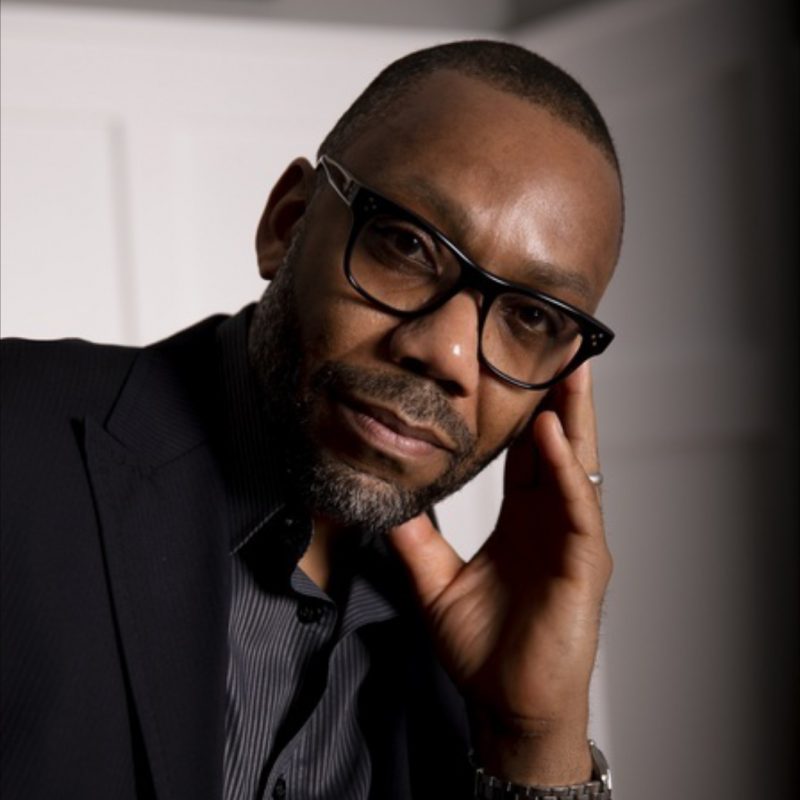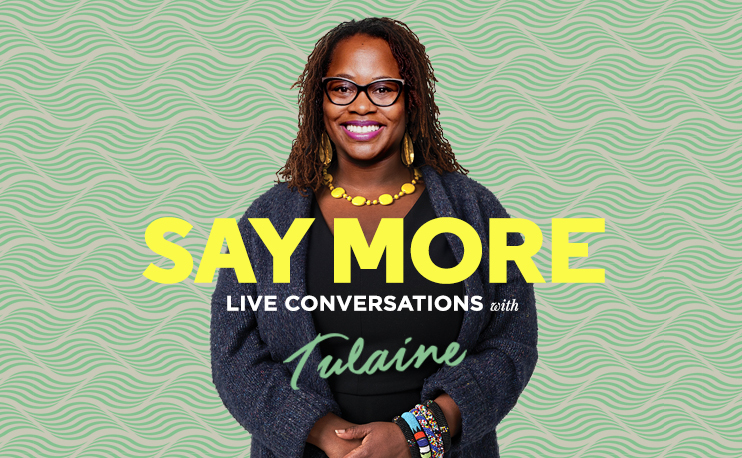“Say More” with Tulaine Montgomery and Andre Perry
In the opening episode of "Say More" Season 2, Tulaine sat down with professor, journalist, and activist Andre Perry. The pair discussed Andre's research, which exhibits the pervasiveness of policy violence within Black, Latino/a/x, and Indigenous communities, and what can be done to architect a more equitable society.
November 12, 2020 Inclusive Impact Action Summit, February 2020Know your price and know your worth. The research shows that assets [within the Black community] are strong—stronger than they are priced. We should not sell ourselves short.
Episode 1 of Tulaine Montgomery’s “Say More” Instagram live series was complete with transformative ideas on structural inequality, collective consciousness, and afrofuturism. The episode featured Andre Perry—renowned professor, award-winning journalist, and activist in the field of education. Andre is a researcher at The Brookings Institution. His recent book, “Know Your Price: Valuing Black Lives and Property in America’s Black Cities,” demonstrates the worth of Black people’s intrinsic personal strengths, real property, and traditional institutions—worth that is significantly undervalued. His academic work offers insight on the historical effects of racism and provides a new value paradigm to limit them in the future. In both his work and conversation with Tulaine, Andre analyzes the roots of American racial inequality and redefines the narrative of the racial wealth gap.
I try to imagine spaces that are absent of racism. How would we dress, what would we look like? What would I listen to, what would I sound like, how would I carry myself?
Tulaine and Andre discussed asset and deficit frameworks, which are core to Andre’s research. During the conversation, Andre argued that, when it comes to understanding structural inequality, the American imagination is grounded in a deficit framework—one that defines a group by their problems, or their deficits, rather than their contributions, or their assets.
Andre’s foundational belief, “there is nothing wrong with Black people that ending racism can’t solve,” affirms that racist structures—which devalue Black institutions, presence, and work—represent the fundamental barrier to architecting an equitable society. Implicit bias forestalls transformative change. For example, individuals blame Black people for the conditions of Black neighborhoods and cities, while racist political and historical structures, such as redlining or the gap in funding to people of color, are at fault for creating these circumstances. Further, people conceptualize Black-owned business as lower-quality than white-owned business due to the quality of the Black neighborhood surrounding the business; however, Andre’s research affirms that businesses owned by people of color score higher on Yelp than their white counterparts, but they get less revenue because customers avoid the neighborhood.
We have yet to understand how expansive an economy can be until we include everyone in it.
This deficit mindset neglects the tremendous assets that already exist in the Black community. Andre calls for an upheaval of these myths, and to embrace investment rather than charity in the Black community. “No one invests in problems. Instead, they invest in people to fix problems, which is a reason why education is full of white saviors. Black institutions need investment, not charity. We have tremendous assets. They are just underappreciated.”

Andre’s research unearths the structural violence embedded in American policy and housing markets. In his book, “Know Your Price: Valuing Black Lives and Property in America’s Black Cities,” Andre determined that homes in Black neighborhoods compared to their white counterparts are underpriced by 23% and roughly $48,000 per home, which sums up to $156 billion in lost equity. “$156 billion would have financed more than $4 million businesses based on the average amount Black people use to start up their firms; it would have paid for $8 million four-year degrees based on the average four-year education in the country; it would have paid to replace the pipes in Flint Michigan 3,000 times over; it would have covered all of Hurricane Katrina damage. This is a big number,” said Andre during the conversation. “So this is why I say, ‘There is nothing wrong with Black people that ending racism can’t solve.’ We are constantly blaming people and we have people doing everything they are told is required for the American dream, yet wealth is extracted simply because of the perception of the neighborhood.”
A broken mental model and broken value system won’t be changed. We need to shift our mental models. It's hard for us to advance systemic change if we are operating off of false narratives. In telling the truth, we recognize that we all have been sold a story of deficit and Black struggle when it comes to Black communities.
Central to shifting mental models is ridding the scarcity mindset—a mindset that believes that, in uplifting those with limited assets, people with abundant assets will be negatively impacted. However, Andre trusts that, as a country, we have yet to realize how expansive an economy can be if we include everyone in it. Investing in communities with low-income backgrounds will build an expansive economy.
Andre’s work has cited research that shows that if 15% of Black-owned business adds one additional employee, the economy will expand by $55 billion. “We must develop metrics and specificity that makes the giving more of an investment,” said Andre. “We should be giving to specific types of businesses in specific neighborhoods with specific goals — with the expectation of return.”
In closing, Tulaine and Andre discussed a future free of systemic oppression, which Andre articulated beautifully:
“I try to imagine spaces that are absent of racism. How would we dress, what would we look like, if we did not have racism in our lives? What would I listen to, what would I sound like, how would I carry myself? There are some things that I am going to hold onto: like in the Harlem Renaissance, the colors and the ties. I would run all day long. I would have spaces to create. I believe creating things is the highest form of intelligence. The way you can build something from disparate parts and make something. I would have maker-places all over the community. Places to build, develop software, play, and build things. That’s what I would get into… I get to do that intellectually with my books, with reports, with data. I can still build. But it’s still in reaction to racism. Sometimes I just want to write. And that’s when I am happiest, when I am writing just because.”
I think about the genius of Black people and the genius of people of color. What would it look like if that genius were uninterrupted? What does Black, Brown, and Indigenous genius look like? I think it looks like creation. Business and enterprise; music and art; healthy food, loving spaces, families. We need to focus our energy into this creation because even our fighting is defined by the construct of racism. I just want us to be free.
